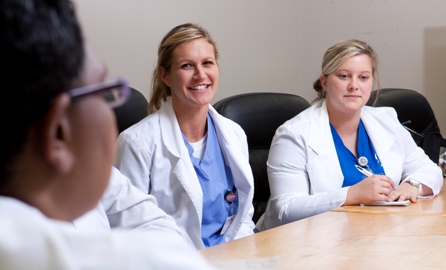blog


In 2011, the Institute of Medicine published The Future of Nursing: Leading Change, Advancing Health. One of its key messages and recommendations was the need for changes in healthcare education to match the breadth of transformation occurring in the U.S. healthcare system, both in terms of the care environment and in the practices clinicians follow to achieve improved outcomes. Their research found increasing necessity among nurses and healthcare workers for a quality healthcare LMS. The IOM report emphasized the need for “equally profound changes in the education of nurses both before and after they receive their licenses” (Institute of Medicine (IOM), 2011). Because nursing is one of the many professions that is changing rapidly in terms of complexity and the technology involved, this report emphasizes that “creating an expectation and culture of lifelong learning for nurses is therefore essential” (IOM, 2011)
What Is Lifelong Learning?
It is important to try to define lifelong learning. A conference on lifelong learning in medicine and nursing describes lifelong learning by identifying its key competencies—“an understanding of evidence-based healthcare and critical appraisal, familiarity with informatics and literature search and retrieval strategies, practice-based learning and improvement methods, self-reflection and assessment, and other skill sets related to knowledge management.” (Macy Foundation, 2010). While sources differ on whether it includes continuing professional development or is just self-motived personal learning, there is little argument about its goal—“to enable health professionals to keep pace with the rapid development of evidence-based information”. An interest in lifelong learning is expected as a natural characteristic of anyone working in healthcare; it “is considered to be an element of professionalism for healthcare professionals” (Novak et al., 2014). Also, at its heart, “lifelong learning involves the ability to resolve issues through inquiry, resource identification, and independent/continual assessment of one’s own learning needs”.
Why Lifelong Learning is Important?
Lifelong learning’s importance is underscored when we examine the nature of professional healthcare learning, which has become “more challenging than ever… because of the plethora of published literature and electronic information that exists, combined with the fact that new knowledge is emerging at an accelerating pace. Upon entering practice, the health care professional experiences increased demands that reduce the time available for learning and assessment, and over time the professional’s knowledge of emerging evidence-based practice and professional competence may deteriorate”.
Drivers of Lifelong Learning
To cultivate lifelong learning, you have to understand what already motivates the nurses who are driven to pursue it. Johns Hopkins Nursing shares that some of the impetus comes from patients and their families, who are “no longer quiescent [and] now demand answers from the nurses who provide their care” (Edelson, 2012). People are more likely than ever to educate themselves about their healthcare conditions and treatments and expect their care professionals to know even more in order to help them. Another motivator can be the healthcare institutions themselves, many of whom are pushing “for their nurses to go back for at least a bachelor’s degree, and the pressure has only increased since The Future of Nursing recommended that 80 percent of all nurses have a bachelor’s degree by 2020” (Edelson, 2012). It doesn’t hurt that lifelong learning encourages clinicians to stay engaged in their jobs and can lead to job shifting within an organization. Retention of employees is yet another reason for healthcare organizations to encourage lifelong learning. Holding on to employees has never been as important as it is now in healthcare—turnover costs are something no one in healthcare can afford. Healthcare executives are definitely knowledgeable about the importance of lifelong learning, both for themselves and the staff at their organizations. Lifelong learning is a vital component of the commitment to be an effective leader, and as Edward Lamb, Chairman of the American College of Healthcare Executives (ACHE) puts it, “To engage fully in professional and leadership development activities, healthcare executives should commit to participating in educational offerings that develop a balance of healthcare management competencies and an evolving set of people skills” (Lamb, 2016). An ACHE-sponsored survey of healthcare CEOs showed that they “mostly value continuing education to understand changes (81%), keep themselves abreast of current trends (74%), to solve problems (62%), and to learn about new technology (60%)” (Walston and Khaliq, 2010).
REFERENCES:
Edelson, Mat, “Lifelong Learning,” Johns Hopkins Nursing, November 29, 2012, accessed at http://magazine.nursing.jhu.edu/2012/11/ lifelong-learning/.
Institute of Medicine (US) Committee on the Robert Wood Johnson Foundation Initiative on the Future of Nursing, at the Institute of Medicine, “The Future of Nursing: Leading Change, Advancing Health,” National Academies Press (US); 2011.
Josiah Macy Foundation, American Association of Colleges of Nursing (AACN) and the Association of American Medical Colleges (AAMC), “Lifelong Learning in Medicine and Nursing Final Conference Report, “ 2010.
Novak, Malorie Kosht, PT, PhD, DPT, et al., “Measuring Health Professions Students’ Orientation Toward Lifelong Learning,” Journal of Allied Health, Fall 2014, Vol 43, No 3.
Walston, Stephen L., PhD, and Amir A Khaliq, PhD, “The Importance and Use of Continuing Education: Findings of a National Survey of Hospital Executives,” The Journal of Health Administration Education, Spring 2010.
Contact HealthStream to speak to a solutions expert learn more about our courses related to Nursing Training.
HealthStream’s learning management system and healthcare training solutions support medical training initiatives and allow for the best patient care.
View All Learning & PerformanceExpand the decision-making skills and effectiveness of your healthcare workforce with HealthStream's workforce development programs and services.
View All Clinical DevelopmentComprehensive, industry-leading provider onboarding and credentialing software that validates health outcomes and supports provider assessment.
View All CredentialingMake sure your healthcare staff can schedule out appointments and work schedules with ease using our line of nurse scheduling software solutions.
View All SchedulingWhen you enact HealthStream's quality compliance solutions, you can do so with the confidence your healthcare organization will meet all standards of care.
View All Quality & ComplianceTransform end-to-end revenue cycle management with comprehensive education
View All Revenue Cycle EducationLearn about our advanced resuscitation training solutions. Our solutions are designed to help improve patient outcomes.
View All Resuscitation